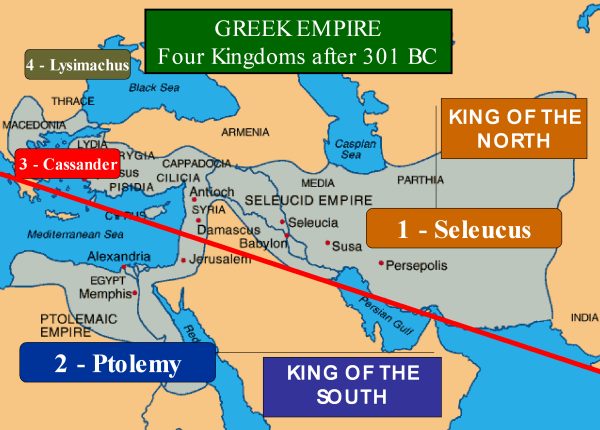Daniel 10 - 12
Structure
The Messenger
Daniel 11:2-4

Daniel 11:5
KOS: Ptolemy I Soter (323 285 BC)
KON: Seleucus I Nicator (305 -281 BC)
They start out as comrades, so in 312, Ptolemy and Seleucus both invaded Syria, and defeated Demetrius in the Battle of Gaza.
Seleucus went to war against Lysimachus (281 BC). Seleucus now held the whole of Alexander's conquests with the exception of Egypt.
Daniel 11:6
KOS: Ptolemy II Philadelphus (285-246 BC)
KON: Antiochus II Theos (305 -281 BC)
Ptolemy II makes an alliance with Antiochus II. He offers his daughter, Berenice in marriage. The arrangement was that Berenices children would be the rightful heirs to the Seleucid throne. And they have a son. And this gives old Ptolemy a connection to the Seleucid Empire.
Theres just one problem: Antiochus was already married. So he ditched his wife Laodice. He honored his agreement with Ptolemy up until Ptolemy died. At that point, he went back to his first wife Laodice.
And Laodice was so grateful that Antiochus took her back after ditching her and denying her children the right to rule that she welcomed Antiochus back and poisoned him. And she wasnt done there. She killed Berenice and her son. She didnt want anyone threatening her childs claim to the throne.
Daniel 11:7-8
KOS: Ptolemy III Euergetes (246-222 BC)
KON: Antiochus II Theos (305 -281 BC)
Ptolemy III Euergetes, (246 BC222 BC) is the third ruler of the Ptolemaic dynasty in Egypt, he was the eldest son of Ptolemy II Philadelphus. He came to power in 246 BC upon the death of his father. He is most noted for his invasions of the northern kingdom of Syria which he commenced upon the murder of his eldest sister Berenice; during this war, the Third Syrian War, he occupied Antioch and -as a recent cuneiform discovery proves- even reached Babylon. Ptolemy III was also the ruler who promoted the translation of Jewish scriptures into Greek as the Septuagint.
Third Syrian War (246-241 BC)
Antiochus II left two ambitious mothers, his repudiated wife Laodice and Ptolemy II's daughter Berenice, in a competition to put their respective sons on the throne. Laodice claimed that Antiochus had named her son heir while on his deathbed, but Berenice argued that her newly born son was the legitimate heir. Berenice asked her brother Ptolemy III to come to Antioch and help place her son on the throne. When Ptolemy arrived, Berenice and her child had been assassinated.
So, Ptolemy declared war on Laodice's newly crowned son, Seleucus II, in 246 BC. He won major victories over Seleucus in Syria and Anatolia.
Daniel 11:9-13
Antiochus III started the fourth Syrian War in an attempt to reclaim lost territory. He recaptured Palestine. This led to the The Battle of Raphia, between Ptolemy IV of Egypt and Antiochus III the Great of the Seleucid kingdom. Fought on 22 June 217 BC near modern Rafah. Ptolemy had 70,000 infantry, 6,000 cavalry, and 73 war elephants (largely African Forest Elephants). Antiochus had 62,000 infantry, 6,000 cavalry, and 103 elephants (Mainly the large Syrian Elephants).
Ptolemy IV won, but he didnt press his advantage. So, Antiochus came back in about 14 years.
Daniel 11:14-20
Antiochus III comes back to attack Ptolemy V of Egypt. He achieves a pact by giving his daughter Cleopatra to marry Ptolemy V. But, Cleopatra becomes a loyal Egyptian. Antiochus III gets no real advantage from the marriage. Cleopatra urges Ptolemy V to make an alliance with Rome.
Antiochus III grabs power wherever he can. In 192 BC he teams up with Hannibal Barca of Carthage. They threaten to take Europe. Rome attacks Antiochus and defeats his advances beyond Greece. Antiochus loses the Battle of Magnesia.
The Battle of Magnesia was fought in 190 BC near Magnesia ad Sipylum, on the plains of Lydia (modern Turkey). The Romans are led by the consul Lucius Cornelius Scipio, against the army of Antiochus III the Great of the Seleucid Empire. The resulting decisive Roman victory ended the conflict for the control of Greece. The treaty forced upon Antiochus III by the victorious Romans was crippling. In the Treaty of Apamea, Antiochus was forced to pay a huge war indemnity of 15,000 Talents along with giving up significant territory in Asia Minor. The Seleucid navy was limited by treaty. It weakened the already fractious Seleucid Empire and halted all ambitions of Antiochus III had of becoming a latter day Alexander the Great. In 187 BC, Antiochus III is murdered while robbing the sanctuary at Elam.
Heaven and Earth

Refer back to Daniel 10.
Nothing happens by chance.
Nothing happens until it is time.
 Link to next sermon
Link to next sermon
 Link to other sermons of Chris Benjamin
Link to other sermons of Chris Benjamin